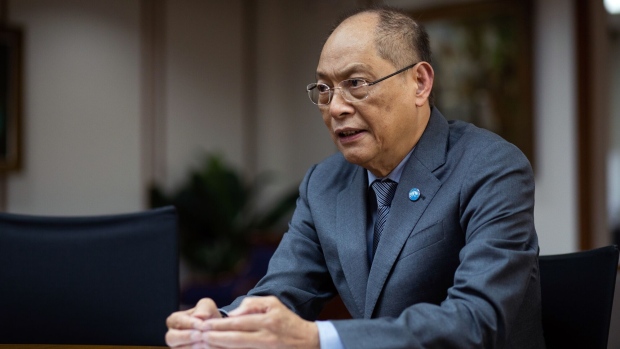Mar 26, 2023
Philippines May Lean Towards Rate Pause in May, Diokno Says
, Bloomberg News

(Bloomberg) -- The Bangko Sentral ng Pilipinas has done enough to address inflation and could pause from raising interest rates at the next policy meeting in May, Finance Secretary Benjamin Diokno said.
“Contrary to some analysts’ view that the BSP’s Monetary Board could even push its policy interest rate higher than 6.5%, I think that the BSP is leaning towards a pause in its policy meeting in May,” Diokno said in a mobile phone message to reporters on Sunday. He is a member of the central bank’s policymaking body.
The BSP raised the overnight reverse repurchase rate by 25 basis points Thursday to 6.25%, the highest since 2007 and putting cumulative increases within the past year at 425 basis points. Afterward, BSP Governor Felipe Medalla said the central bank might not hike at its next meeting in May if prices decline on a month-on-month basis.
Annual inflation eased to 8.6% in February from a 14-year high of 8.7% the previous month, allowing the central bank to shift to a smaller rate increase and trim its inflation forecasts for this year and next.
“In my view, the monetary authorities have done enough,” Diokno said. Monetary policy “is not the only game in town” and “works with a long lag,” so the full impact of the rate hikes have yet to be absorbed by the Philippine economy, according to Diokno. They do appear to have slowed lending, he said.
Diokno, who was central bank governor before becoming finance chief last year, said nonmonetary measures could address inflation more effectively.
Earlier this month, President Ferdinand Marcos Jr. approved the creation of an inter-agency committee to advise him on measures to mitigate inflation. Nonmonetary measures have been proposed and approved by the committee, said Diokno, and he expects the moves to bear fruit in the near term.
He also said the Philippine peso is likely to appreciate as the US dollar weakens and growth continues in tourism income, investment inflows, remittances from Filipinos working oversea and receipts from business process outsourcing firms. The peso has gained 2.6% so far this year, making it one of the best performing currencies in Asia.
--With assistance from Ditas Lopez.
(Adds comments and background starting in the third paragraph.)
©2023 Bloomberg L.P.





